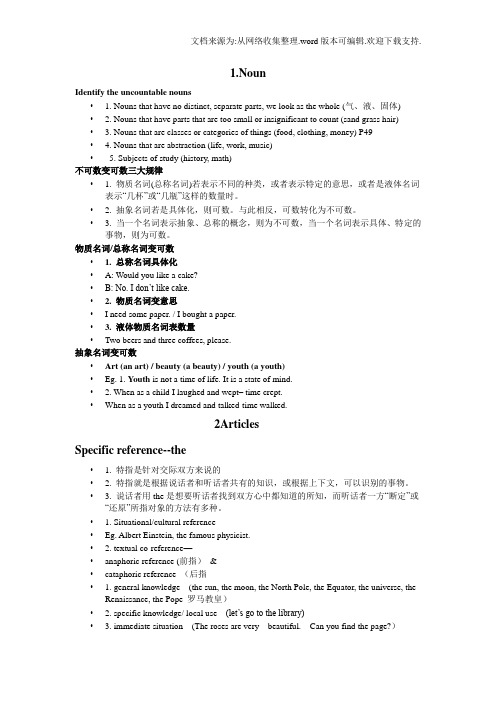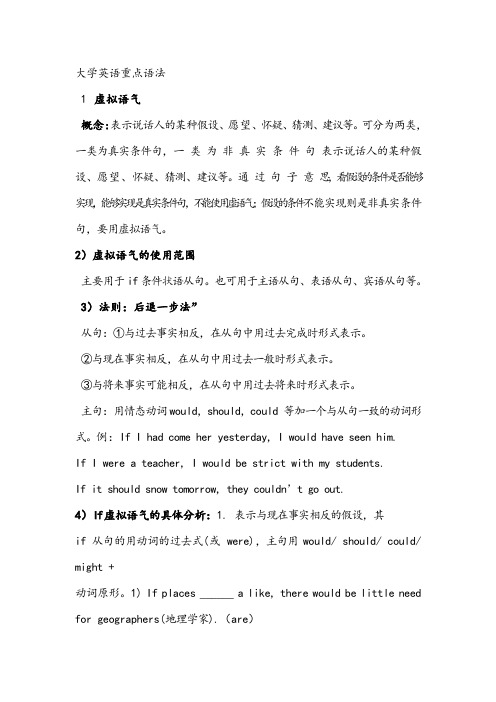大学英语语法重点
大学英语知识点总结归纳

大学英语知识点总结归纳一、语法知识点1. 英语句子的基本构成英语句子的基本构成包括主语、谓语、宾语等,根据不同的语法成分可以分为简单句、并列句、复合句等多种形式。
掌握句子的基本构成对于语言的准确表达和理解至关重要。
2. 时态英语中的时态包括一般现在时、一般过去时、一般将来时、现在进行时、过去进行时、现在完成时、过去完成时等。
时态的正确使用可以使语言表达准确清晰。
3. 语态英语中的语态包括主动语态和被动语态,正确使用语态可以使表达更加灵活多样。
4. 语气英语中的语气包括陈述语气、疑问语气、祈使语气等,每种语气的使用都有其特定的情境和表达方式。
5. 并列连词和从属连词并列连词用于连接并列结构的词、短语、从句等,包括and、or、but等;从属连词用于连接主从复合句,包括because、when、although等。
6. 形容词和副词的比较级和最高级形容词和副词的比较级和最高级形式可以用于比较不同事物的程度和大小。
7. 定冠词和不定冠词定冠词包括the,不定冠词包括a和an,使用时需要根据名词的情境和特点正确选择。
8. 代词代词分为人称代词、物主代词、反身代词、指示代词等,根据情境需要选择正确的代词形式。
9. 主谓一致主谓一致是指主语和谓语在人称和数上保持一致,是英语句子中的重要语法规则。
10. 介词介词用于连接名词、代词、动词或形容词等,构成介词短语用于修饰其他成分,掌握介词的使用可以使语言表达更加丰富。
二、词汇知识点1. 单词的拼写和发音掌握英语单词的拼写和发音是学习英语的基本功,有助于提高语言表达的准确性。
2. 同义词和反义词同义词和反义词可以丰富语言表达的方式,帮助学习者避免重复使用相同的词汇。
3. 词汇搭配词汇搭配是指在语言表达中,词语之间常常有固定的搭配关系,如动词搭配介词、名词搭配形容词等,掌握词汇搭配可以使表达更加自然流畅。
4. 词义辨析英语中存在大量近义词和异义词,学习者需要掌握它们的区别和正确用法,避免混淆。
大学英语语法总结(全面)

大学英语语法总结(全面)大学英语语法总结(全面完整版)1. 介词(Prepositions)- 表示地点:at, in, on- 表示时间:at, in, on- 表示方式:by, with- 表示原因:because of, due to- 表示目的:for, to2. 冠词(Articles)- 定冠词:the- 不定冠词:a, an3. 代词(Pronouns)- 主格代词:I, you, he, she, it, we, they- 宾格代词:me, you, him, her, it, us, them- 所有格代词:my, your, his, her, its, our, their- 反身代词:myself, yourself, himself, herself, itself, ourselves, themselves4. 名词(Nouns)- 单数名词:book, chair, dog- 复数名词:books, chairs, dogs- 不可数名词:water, money, information5. 动词(Verbs)- 一般现在时:I walk, you walk, he/she/it walks, we walk, they walk- 一般过去时:I walked, you walked, he/she/it walked, we walked, they walked- 现在进行时:I am walking, you are walking, he/she/it is walking, we are walking, they are walking- 过去进行时:I was walking, you were walking, he/she/it was walking, we were walking, they were walking- 一般将来时:I will walk, you will walk, he/she/it will walk, we will walk, they will walk6. 形容词(Adjectives)- 描述名词特征:big, small, tall- 比较级:bigger, smaller, taller- 最高级:biggest, smallest, tallest7. 副词(Adverbs)- 表示方式:quickly, slowly- 表示程度:very, extremely- 表示时间:now, yesterday8. 连词(Conjunctions)- 表并列:and, or- 表递进:furthermore, moreover- 表转折:however, but- 表原因:because, since以上是大学英语语法的简要总结,希望对你有帮助。
大学英语语法(英语专业必看)

1.NounIdentify the uncountable nouns• 1. Nouns that have no distinct, separate parts, we look as the whole (气、液、固体) • 2. Nouns that have parts that are too small or insignificant to count (sand grass hair)• 3. Nouns that are classes or categories of things (food, clothing, money) P49• 4. Nouns that are abstraction (life, work, music)• 5. Subjects of study (history, math)不可数变可数三大规律• 1. 物质名词(总称名词)若表示不同的种类,或者表示特定的意思,或者是液体名词表示“几杯”或“几瓶”这样的数量时。
• 2. 抽象名词若是具体化,则可数。
与此相反,可数转化为不可数。
• 3. 当一个名词表示抽象、总称的概念,则为不可数,当一个名词表示具体、特定的事物,则为可数。
物质名词/总称名词变可数• 1. 总称名词具体化•A: Would you like a cake?•B: No. I don’t like cake.• 2. 物质名词变意思•I need some paper. / I bought a paper.• 3. 液体物质名词表数量•Two beers and three coffees, please.抽象名词变可数•Art (an art) / beauty (a beauty) / youth (a youth)•Eg. 1. Youth is not a time of life. It is a state of mind.• 2. When as a child I laughed and wept– time crept.•When as a youth I dreamed and talked-time walked.2ArticlesSpecific reference--the• 1. 特指是针对交际双方来说的• 2. 特指就是根据说话者和听话者共有的知识,或根据上下文,可以识别的事物。
大一英语语法考试知识点汇总

大一英语语法考试知识点汇总一、名词(Nouns)名词是指人、物、地点或抽象事物的名称。
在句子中,名词通常用作主语、宾语、或补语。
1. 可数名词(Countable Nouns):表示可以单独计数的物品,例如book(书)。
2. 不可数名词(Uncountable Nouns):表示不可分割的物质或抽象概念,例如water(水)。
二、动词(Verbs)动词表示行为、状态或存在。
在句子中,动词通常用作谓语。
1. 及物动词(Transitive Verbs):需要接受动作的对象才能表达完整意义的动词,例如eat(吃)。
2. 不及物动词(Intransitive Verbs):不需要接受动作的对象就能表达完整意义的动词,例如sleep(睡觉)。
三、形容词(Adjectives)形容词用于描述名词的特征或性质。
在句子中,形容词通常位于名词前面。
1. 基本形容词(Basic Adjectives):用于表达物品的描述,例如beautiful(美丽的)。
2. 比较级形容词(Comparative Adjectives):用于比较两个物品的描述,例如bigger(更大的)。
3. 最高级形容词(Superlative Adjectives):用于比较三个或三个以上物品的描述,例如biggest(最大的)。
四、副词(Adverbs)副词用于修饰动词、形容词、或其他副词,用来表示时间、地点、方式、程度等。
1. 时间副词(Adverbs of Time):用于描述动作发生的时间,例如now(现在)。
2. 地点副词(Adverbs of Place):用于描述动作发生的地点,例如here(这里)。
3. 方式副词(Adverbs of Manner):用于描述动作的方式,例如carefully(小心地)。
4. 程度副词(Adverbs of Degree):用于描述动作或状态的程度,例如very(非常)。
五、代词(Pronouns)代词用于替代名词,以避免重复使用。
大学英语重点语法

大学英语重点语法1 虚拟语气概念:表示说话人的某种假设、愿望、怀疑、猜测、建议等。
可分为两类,一类为真实条件句,一类为非真实条件句表示说话人的某种假设、愿望、怀疑、猜测、建议等。
通过句子意思,看假设的条件是否能够实现,能够实现是真实条件句,不能使用虚语气;假设的条件不能实现则是非真实条件句,要用虚拟语气。
2)虚拟语气的使用范围主要用于if条件状语从句。
也可用于主语从句、表语从句、宾语从句等。
3)法则:后退一步法”从句:①与过去事实相反,在从句中用过去完成时形式表示。
②与现在事实相反,在从句中用过去一般时形式表示。
③与将来事实可能相反,在从句中用过去将来时形式表示。
主句:用情态动词would, should, could 等加一个与从句一致的动词形式。
例:If I had come her yesterday, I would have seen him.If I were a teacher, I would be strict with my students.If it should snow tomorrow, they couldn’t go out.4)If虚拟语气的具体分析:1. 表示与现在事实相反的假设,其if 从句的用动词的过去式(或were),主句用would/ should/ could/ might + 动词原形。
1) If places ______ a like, there would be little need for geographers(地理学家).(are)2)If I _____ the meaning of the word, I wouldn't have to look itup.(know)3)2. 表示与过去事实相反的假设,if从句用过去完成时即had+过去分词,主句用would / should / could / might + have +过去分词。
大学英语语法重点

二、may can might could 的异同
1. May / might 事实上的可能 2. Can / could 理论上的可能
The road may be blocked. The road can be blocked. Can he tell a lie? Yes, he may. 3. Not 否定 may /might, 否定的是句子中的主动词。 They may / might not get there on time tomorrow. They can / could not get there on time tomorrow.
三、做状语 –ing/ to
1. In order to, so as to, only to, too…to.., so … as to… 2. 悬垂
Going home, mother cooked a good meal. 3. 独立主格
Weather permitting, we will go for a picnic tomorrow. 4. -ing/-ed 主动 被动
Ought to 与should 基本类似,但强调责任、义务、应该做, 或者逻辑上的必然性时用ought to
As a student you ought to study hard. I think I should try to lose some weight. It is starry tonight; it ought to be a fine day tomorrow.
3. needn’t have done Since the meeting has been canceled, they needn’t
英专大一语法知识点总结
英专大一语法知识点总结一、主语和谓语动词的一致性主语和谓语动词在人称和数上必须保持一致。
如果主语是第三人称单数,谓语动词要加上-s或-es。
例如:- She loves running in the park.(她喜欢在公园里跑步。
)- The dog barks loudly at night.(那只狗在晚上大声叫。
)二、时态的正确使用在英语中,时态有过去、现在和将来三种,每种时态的使用都有一定的规则。
以下是一些常用时态的用法:1. 一般现在时:表示常态、客观事实、经常性、习惯等情况。
例如:- I usually go to school by bus.(我通常坐公交车去学校。
)- Water boils at 100 degrees Celsius.(水在100摄氏度沸腾。
)2. 现在进行时:表示现在正在进行的动作或状态。
例如:- He is studying in the library.(他正在图书馆学习。
)- We are having dinner.(我们正在吃晚饭。
)3. 一般过去时:表示过去发生的动作或状态。
例如:- I visited my grandparents last weekend.(上个周末我去看望了我的祖父母。
)- She lived in London when she was young.(她年轻的时候住在伦敦。
)4. 过去进行时:表示过去正在进行的动作或状态。
例如:- They were playing basketball at 5 p.m. yesterday.(昨天下午5点他们在打篮球。
)- I was studying for the exam all night.(我整夜都在备考。
)5. 一般将来时:表示将来某个时间要发生的动作或状态。
例如:- We will have a party next week.(下周我们将举办派对。
)- She is going to travel around the world.(她打算环游世界。
大学英语语法总结归纳
大学英语语法总结归纳英语是国际间通行的语言,也是大学教育中必备的一门学科。
掌握良好的英语语法对于学习和运用英语至关重要。
本文将对大学英语语法进行总结归纳,帮助读者更好地理解和掌握英语语法知识。
一、名词名词是表示人、事物、地点、状态等概念的词,并可用来作主语、宾语、表语等。
名词分为可数名词和不可数名词。
1. 可数名词可数名词有单数和复数两种形式,单数用于表示一个人或物,复数表示多个。
单数名词前可用冠词a/an或不用,复数名词前用冠词the。
例子:- I have a book.(我有一本书。
)- They are my friends.(他们是我的朋友们。
)2. 不可数名词不可数名词表示无法分为个体的物质或抽象概念。
它没有复数形式,也不能与数词一起使用。
例子:- I need some advice.(我需要一些建议。
)- Milk is good for you.(牛奶对你有好处。
)二、代词代词是用来代替名词的词语。
根据其在句子中的作用和意义,代词可以分为人称代词、物主代词、指示代词、疑问代词和不定代词等。
1. 人称代词人称代词用来代替特定的人或事物,在不同的人称角色中有不同的形式。
例子:- I am a student.(我是一个学生。
)- He is my brother.(他是我的兄弟。
)2. 物主代词物主代词用来表示所属关系或所有关系。
在人称代词的基础上,加上-s或-apostrophe+s来构成。
例子:- This is my book.(这是我的书。
)- Is this your cat?(这是你的猫吗?)3. 指示代词指示代词用来指示特定的人或物。
例子:- This is my car.(这是我的车。
)- That is her house.(那是她的房子。
)4. 疑问代词疑问代词用来引导疑问句,询问特定的人或物。
例子:- Who is coming?(谁来了?)- What do you want?(你想要什么?)5. 不定代词不定代词用来代替不确定或泛指的人或事物。
大学英语4级语法笔记
大学英语4级语法笔记
1. 主谓一致
- 主语和谓语在人称和数上保持一致。
- 当主语是单数第三人称时,谓语动词要加s。
- 当主语是复数时,谓语动词不加s。
2. 动词时态
- 一般现在时:表示经常性或惯性的动作。
- 现在进行时:表示现在正在进行的动作。
- 一般过去时:表示过去某个时间发生的动作。
- 过去进行时:表示过去某一段时间内正在进行的动作。
- 现在完成时:表示过去某个时间发生的动作对现在造成的影
响或结果。
- 过去完成时:表示过去某个时间发生的动作对过去的另一个
时间或动作造成的影响或结果。
3. 形容词和副词的比较级和最高级
- 比较级:注意形容词和副词在比较级前面要加上more或less。
- 最高级:注意形容词和副词在最高级前面要加上the most或the least。
4. 名词所有格
- 表示属于关系时,在名词后面加's。
- 表示复数名词所有格时,在名词后面加'。
5. 祈使句和感叹句
- 祈使句表示命令、请求或建议,一般用动词原形。
- 感叹句表示惊讶、赞叹等情感,常以What、How等引导。
6. 介词的用法
- 介词用于表示位置、时间、方式等关系。
- 常用的介词有in、on、at、under、over等。
以上是大学英语4级语法的一些基础知识点,请在学习和写作时注意运用。
大学英语语法的知识点总结
大学英语语法的知识点总结一、名词名词是指人、事物、概念、地方等的名称,是英语中不可或缺的一部分。
名词可以分为可数名词和不可数名词。
可数名词有单数和复数之分,而不可数名词则只有单数形式。
1. 可数名词的复数形式可数名词的复数形式通常是在词尾加“-s”或“-es”,例如:book-books, box-boxes, bus-buses 等。
还有一些不规则的变化,如:child-children, woman-women, mouse-mice等。
2. 不可数名词不可数名词一般是不能直接加“-s”或“-es”变成复数形式的,它们表示抽象概念、液体、物质等,如:milk, water, gold, information等。
3. 名词的所有格名词的所有格表示所属关系,一般在名词后面加“'s”或“s'”,如:Tom's book, the students' room等。
4. 名词的可数性判断一般来说,可以通过名词前是否有不定冠词(如a/an)或数词(如one, two)来判断名词的可数性。
但也有一些名词既可数又不可数,意义不同,如:music(不可数,表示音乐),a music(可数,表示一首音乐)。
二、代词代词是替代名词或其他成分的实词,用来避免重复,是句子中不可缺少的一部分。
代词包括人称代词、物主代词、反身代词、指示代词、相互代词、不定代词等。
1. 人称代词人称代词表示说话者、听话者、谈话对象等的人称,包括主格和宾格两种形式。
主格:I, you, he, she, it, we, you, they宾格:me, you, him, her, it, us, you, them2. 物主代词物主代词表示所有关系,包括形容词性物主代词和名词性物主代词。
形容词性物主代词:my, your, his, her, its, our, your, their名词性物主代词:mine, yours, his, hers, its, ours, yours, theirs3. 反身代词反身代词表示动作的主语同时是动作的宾语,包括单数反身代词和复数反身代词。
- 1、下载文档前请自行甄别文档内容的完整性,平台不提供额外的编辑、内容补充、找答案等附加服务。
- 2、"仅部分预览"的文档,不可在线预览部分如存在完整性等问题,可反馈申请退款(可完整预览的文档不适用该条件!)。
- 3、如文档侵犯您的权益,请联系客服反馈,我们会尽快为您处理(人工客服工作时间:9:00-18:30)。
•语法一:虚拟语气
•一、If 引导的从句
•1. If I were you, I would go abroad to have the further study. •2. If you had done your homework, you would not have been criticized by the teacher. •3. If he were to / should come back from America tomorrow, he would join our party. •4.If you had done your homework, you would not be criticized by your teacher now.
•三、固定句型 (主句现在,从句过去;主句过去,从句过完)
1. It is about/ high time (that) + 过去
•
It is about time that we had dinner.
•2. would rather +过去完成
•
I would rather he had not invited me.
•3. needn’t have done
•
Since the meeting has been canceled, they needn’t
have got there so early.
•语法二:非谓语动词
•一、做主语 to do
1. It is n. to do
• future.
It is my dream to become a super star in the
• 2. It takes sb. some time to do
• 3. It is adj. for sb. to do sth.
• 4. It is adj. of sb. to do sth.
•一、做主语 -ing
• 1. It is no use, no good, no fun, a great pleasure, a waste of time, a bore, etc + doing
•3. Wish
•
I wish that I could go to France.
•4. If only + 过去
•
If only I were twenty years old.
•5. As if / as though
•
He talked about Egypt as if he had been there.
•三、固定句型 (主句现在,从句过去;主句过去,从句过完)
1. If only he had been here. 要是他当时在这儿就好了。
2. I dread the coming exams. If only I could have time to review my lessons. 我对即将到来的考试非常担心。如果我有时间复习该有多好啊。
3. If only I had another chance. 要是我再有一次机会就好了。 4. I am so tired. If only I can take the day off tomorrow. 太疲倦了。如果
明天能不上班多好。 5. If only problems would come one at a time! 要是问题一次只发生一个
该多好! 6. If only it clears up, we‘ll go. 只要天一放晴,我们就去。 7. If only one had an unlimited supply of money! 要是财源不断就好了! 8. She would be a very good player if only she could get it together. 她若能
•
It is no use crying over the spilt milk.
• 2. It is expensive, good, interesting, nice, pointless, useless, worthwhile, etc. + doing
•
It is useless asking him for help.
•二、从句中的(should)do 句型
1.He proposed that the girl (should) be the first to leave. • suggest, propose, ask, command, demand, require, urge, order, recommend, insist •2. It is my suggestion that he be our monitor. •3. It is required that the new law be enforced at once. •上述动词的过去分词以及 strange, important, necessary, essential, urgent, natural, unusual, advisable, desirable, vital用 于it is… that..时
ld have done
•
You should have arrived there earlier.
•2. Should not have done
•
He shouldn’t have presented the report to the mayor.
• 3. There is no doing
•二、做宾语 –ing/ to • 1. I remember locking the door . • Remember to lock the door when you leave . • 2. try + doing,含义“试一试”或“试试做某事” ; • try +to do,含义是“做一番努力,试图做某
